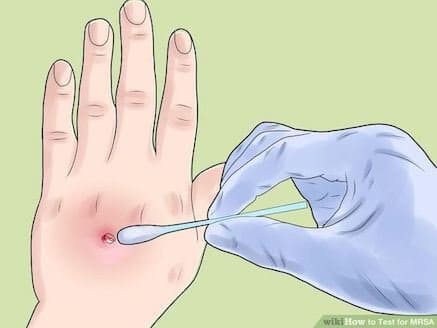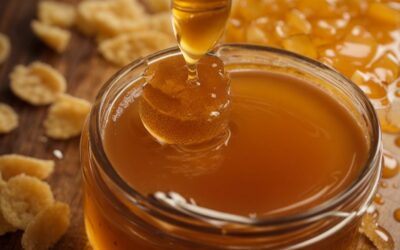What Are The Benefits Of Manuka Honey?

It is no secret that genuine Manuka honey has outstanding health benefits with many health claims.
That is why we have created this guide, which features our top 8 Health Benefits of Manuka honey.
As Manuka honey is rich in nutrients and has high anti-microbial properties, it is still being examined to understand how it can help people fully.
The UMF Honey Association in New Zealand conducts scientific research and works with honey producers to better understand the Manuka honey benefits with scientific evidence.

1. Treats Wounds, Burns And Ulcers
Ever think that bees might be tiny doctors in disguise? Thanks to Manuka honey’s anti-inflammatory and antioxidant power, healing wounds and burns could get faster.
Picture honey as your first aid kit! The acidity helps wounds breathe and heal, while its natural sugars can dehydrate bacteria. So, from burns to boils, Manuka might be the sweet savior your skin needs.
Its anti-inflammatory and antioxidant characteristics decrease inflammation in wounds and wound infections.
Manuka honey has a pH of between 3.2 and 4.5. The acidity promotes the release of oxygen into the blood, which facilitates wound healing.
In extensive lab testing of this age old remedy, it has been found that Manuka honey effectively inhibits bacterial pathogens such as MRSA.
Honey disrupts the formation of new bacteria, such as Streptococcus and Staphylococcus species.
An acidic environment also reduces the protease, which inhibits the process of wound healing.
The sugar that is naturally occurring in honey draws out the water of damaged tissues (osmosis) and helps treat wounds.
This process greatly reduces swelling and activates the lymph nodes. The bacteria become dry as the sugar pulls out the water so that they cannot multiply.
Types of wounds that can be treated with Manuka honey:
- burns
- boils
- ulcers

2. Reduces Acne And Eczema
Zits. We all hate ’em. Acne is a problem for many, both young and old. But guess what? Manuka honey might be that secret sauce to clear skin.
Thanks to its antimicrobial properties, it’s like a bouncer, showing bacteria the exit door.
Try a Manuka facial mask. It’s like a spa day, but with nature’s golden touch.
There are a number of factors that cause acne flare-ups such as imbalanced hormones or food sensitivities.
How to fix hormonal imbalances and improve skin conditions to get the most benefits for your skin?
Well, you can start by fixing your diet and applying manuka honey!
It has been found to have strong antimicrobial properties.
The full-spectrum of authentic Unique Manuka Factor (UMF) Manuka honey from New Zealand consists of the following:
- methylglyoxal and hydrogen peroxide (high antimicrobial activity)
- amino acids
- vitamins and minerals
As honey is great at killing bacteria, many people have started using it as a treatment for acne.
The research is clear that it preserves its properties even when diluted in water.
Also, given its anti-inflammatory properties, the golden nectar is said to decrease inflammation associated with acne.
Yet, there is very limited research on its ability to treat acne.

3. Fixes Digestive Symptoms
From bloating to those “oops” moments, IBS can be a real party pooper.
But, there’s some chatter that Manuka honey can calm the storm in our bellies.
Some even say they’ve felt relief from its sweet embrace. Think of Manuka as a gentle lullaby for your digestive system.
No wonder honey has been used to treat digestive disorders for centuries.
Irritable Bowel Syndrome (IBS) is a condition of the lower intestine.
It affects 8–28% of people around the world.
Over the years we have talked to many people suffering from IBS-D (diarrhea) and we have reported a lot of success when supplementing with honey.
In our experience, we have found that Manuka honey has greatly reduced IBS-D symptoms and helped with digestion. We have reported significant decreases in stomach rumbling and strange noises.
At first, the symptoms became less frequent and the stomach seemed to calm down. The trips to the bathroom became much less frequent. After one month of daily supplementation, all my ailments became more manageable in our test subjects.
Studies have shown that variable doses of Manuka honey reduce inflammation of the colon in groups treated for Irritable Bowel Syndrome (IBS) and Irritable Bowel Disease (IBD).
A study conducted at Chandigarh Institute showed a significant decrease in inflammation in the colon.

4. Prevents Gastric Ulcers
Those painful ulcers caused by H. pylori? Manuka honey might be their nemesis.
Imagine sipping on a potion that soothes and fights off these nasty bugs simultaneously. Sweet relief, quite literally!
H. pylori is a type of bacteria that forms sores on the lining of the stomach, which causes stomach pain, nausea, and bloating.
It is responsible for most types of gastric ulcers.
Over the past five years, research has shown that Manuka honey can greatly help reduce gastric ulcers that form sores on the stomach lining.
Users have experienced a significant reduction in stomach pain while supplementing with one tablespoon of UMF Manuka honey daily.

5. Soothes A Sore Throat
If your throat is feeling scratchy, Manuka honey might be the remedy for you.
People have used hot honey with lime to cure a cold or a sore throat forever.
The antibacterial properties make it an excellent weapon for attacking harmful bacteria.
One of the great things is that will also have a soothing effect on your throat and provide relief from coughing and greatly decrease pain. You can think of Manuka honey as a natural cough suppressant.
A study on patients with Streptococcus showed a significant decrease in the mutant bacteria.
Used in tandem with sinus-flushing with warm water, we have managed to combat painful sinuses in a week’s time.

6. Kills Cancer
The antimicrobial properties of high-grade UMF Manuka honey have reduced tumor size.
When administered intravenously, it has been shown to induce cell death mutation and prevent the spreading of cancerous cells.
Tests clearly show that tumor growth is slowed down. Mice treated with it and taxol “exhibited better survival initially”.
This tells us that intravenously-administered Manuka honey inhibits the growth of cancerous cells. Which is why the UMF15+ and up has antibacterial activity.
Further evidence is needed to fully understand how Manuka honey can be used to kill off cancer.

7. Helps With Sleep
Imagine drifting into dreamland, wrapped in a sweet Manuka embrace.
This honey can help our brains release feel-good chemicals, making it easier to catch those Zs.
So, if you’re chasing sweet dreams, a spoonful of Manuka before bed might be the golden ticket.
People around the world have used honey for a good night’s sleep.
The naturally occurring sugar in honey releases insulin into the blood which allows tryptophan to enter the brain.
Why do we need tryptophan?
Tryptophan is a type of amino acid that is active in the brain and is converted into niacin, an essential B vitamin.
Niacin plays a crucial role in the creation of serotonin.
Serotonin is a neurotransmitter necessary to produce melatonin which puts you to sleep.
How to use honey for sleep?
All you need is one tablespoon of UMF or MGO Manuka honey before and you’re ready to go.
You can also enjoy it in a hot cup of bedtime tea.
Recovery is key for a strong body and mind so give yourself a treat and try out some delicious Manuka honey before bedtime.

8. Improves Dental Health
Think honey and teeth are a bad match? Think again!
Manuka’s got some cool tricks up its sleeve.
After giving it a whirl, some folks have noticed less plaque and healthier gums. So, for a superstar smile, Manuka might just be the sweet secret.
More than 50% of Americans had some form of periodontal disease in 2019.
Hundreds of users have reported reduced inflammation and less plaque formation.
Researchers found that Manuka honey that is above UMF 10+ has an antibacterial activity (medical grade manuka) that is highly effective at killing harmful oral bacteria such as P. gingivalis and A. actinomycetemcomitans.
In our testing, we have reported a reduction in plaque and gingivitis when supplementing with just one tablespoon of medical grade honey.
Contrary to popular belief, daily supplementation of Manuka honey does not cause tooth decay and promotes healthy gums.
Final Thoughts
This concludes our list of 8 Manuka honey benefits.
Some of the most profound health benefits include the relief of digestive issues as well as wound healing and treatment.
It also has antibacterial, antiviral and anti-inflammatory properties that may help treat various illnesses, such as IBS (Irritable Bowel Syndrome), Gastric Ulcers, Diabetic Ulcers, Periodontal Disease, acid reflux, and throat infections.
It also helps with sleep and boosts the immune system and heal wounds due to its rich nutritional profile antibacterial properties. It also helps with various skin conditions.
More research is needed to fully understand the properties of the manuka bush and its healing effects.
Independent bodies such as New Zealand’s UMF Association conduct tests on Manuka honey to meet the rigorous UMF standards. You can learn more about UMF and MGO grading systems.
Frequently Asked Questions
What are the benefits of Manuka honey?
Manuka honey supports the Immune system, helps with wound treatment, fixes stomach problems, and more.
Is Manuka honey safe?
Manuka honey is safe to consume for anyone older than 12 months. Here are specific groups of people that should take extra care when consuming Manuka honey:
What is so special about Manuka honey?
It contains very high amounts of MGO and has unmatched antiviral properties and anti bacterial properties as well as antioxidant properties. Scientific research shows that Manuka has unique compounds, notably the active ingredient methylglyoxal (MGO), which boosts its health properties.
Is all Manuka honey the same?
No two superhero capes are identical, and not all honey is the same. Manuka honey’s potency is often graded using the UMF rating. The higher the UMF number, the more potent the benefits. Raw honey has different qualities too. Always check the label to know what you’re diving into.
Why is Manuka honey more expensive than other honeys?
Quality and rarity, my friend. Imagine finding a diamond in a coal mine. Manuka is produced in limited regions, and its unique properties make it highly sought after and expensive.
I’m a Manuka honey enthusiast and creator of Manuka Honey Organic, a blog where I share my journey with authentic Manuka honey from New Zealand. I want everyone to learn about the healing powers of Manuka honey.





